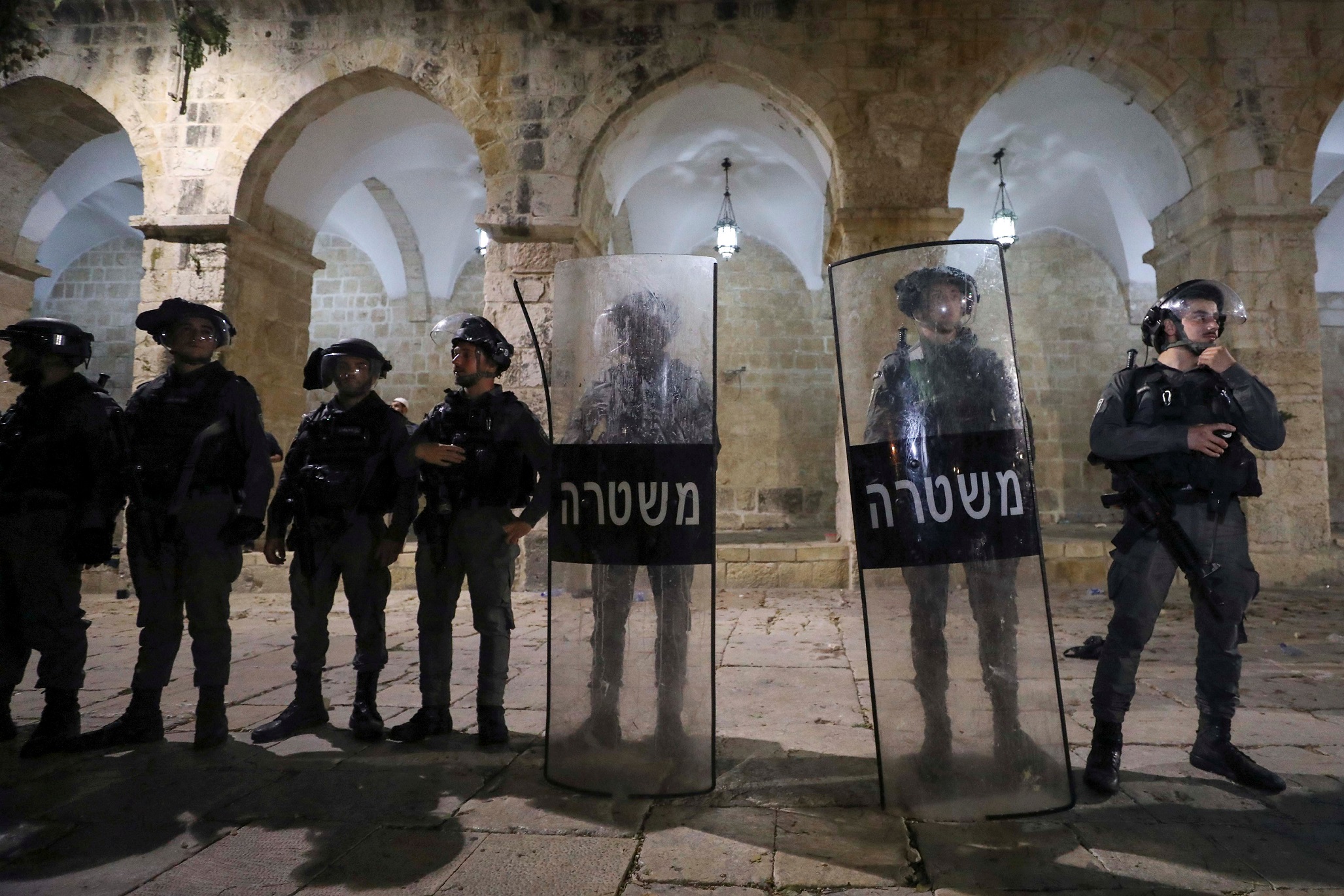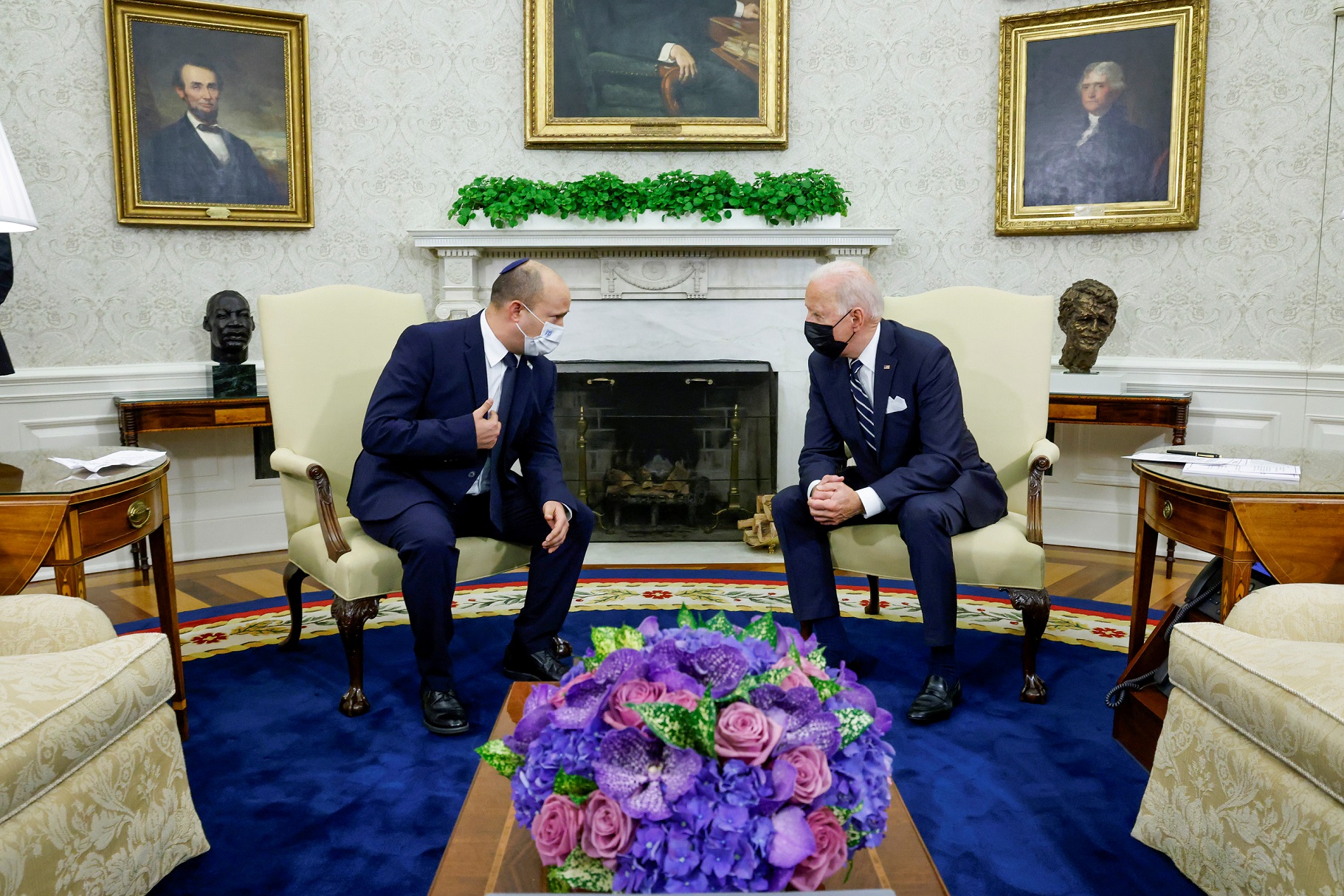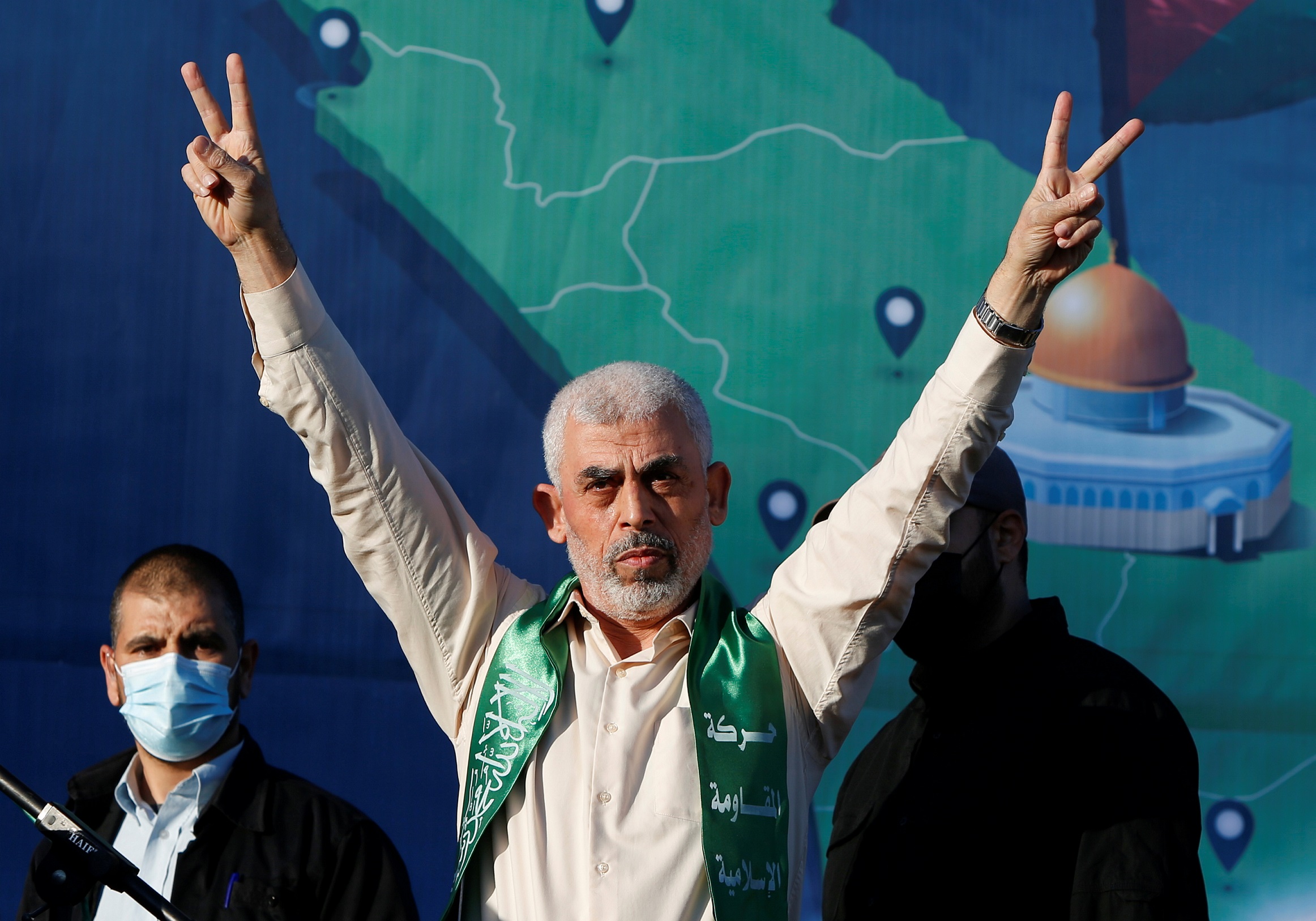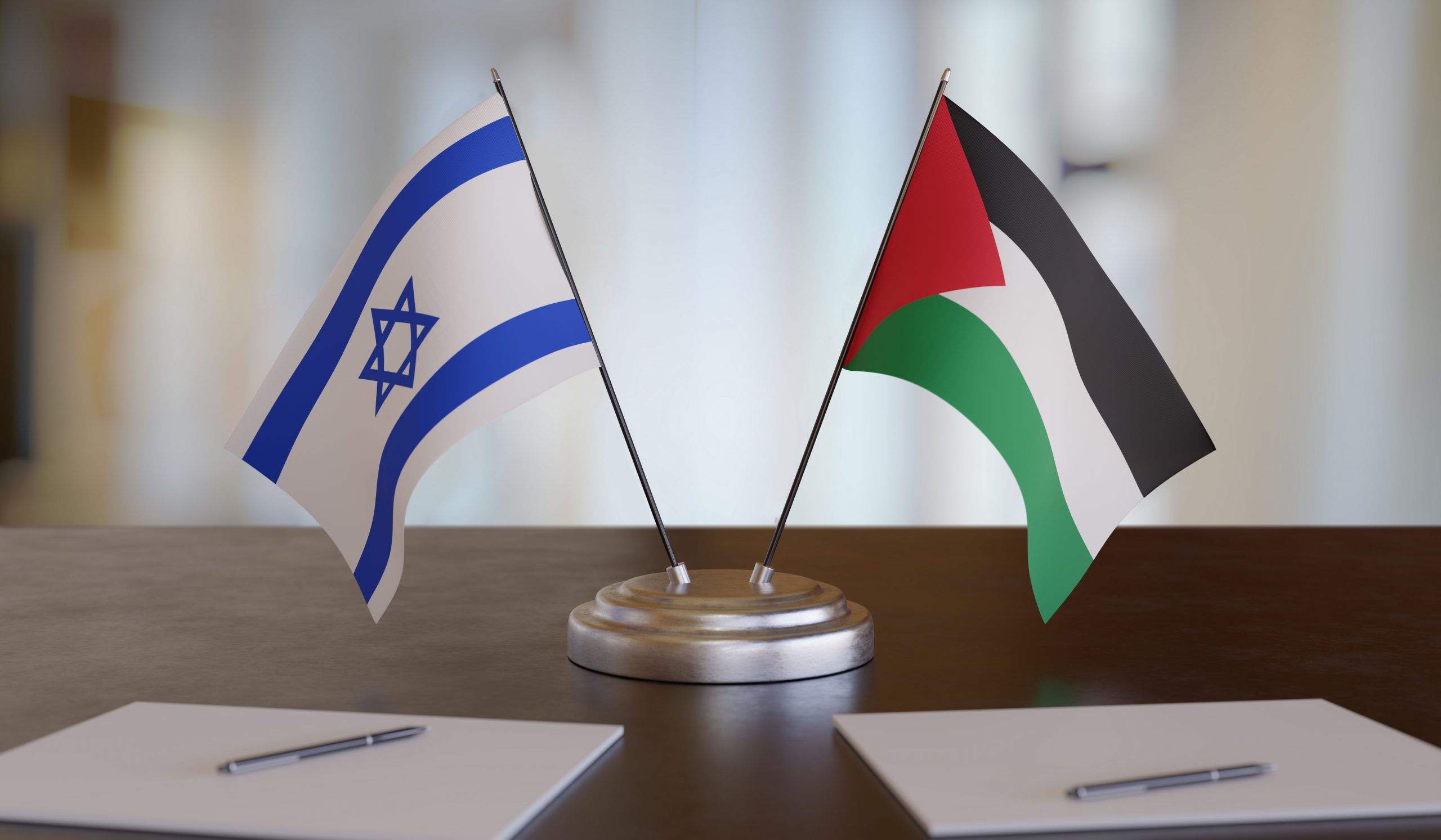Publications
Special Publication, February 3, 2022
In advance of its Annual International Conference, the Institute for National Security Studies (INSS) conducted a simulation designed to assess the prospects of an initiative to convene an international conference on resolving the Israeli-Palestinian conflict. In this simulation, a discussion by the UN Security Council took place following an escalation in violence and terrorism in the Israeli-Palestinian arena, which extended to other arenas. Experts and former senior figures from the Palestinian Authority, Jordan, Egypt, the United Arab Emirates, the United States, Russia, China, and Germany joined INSS researchers to play the roles of the actors in the simulation.
The Scenario
Riots break out on the Temple Mount early in the month of Ramadan, encouraged by Hamas and other Islamic factions. Their goal is to reproduce the wave of violent events that preceded Operation Guardian of the Walls in May 2021.
The Israeli Police forces act to quell the riots and enter the al-Aqsa Mosque compound. This measure increases the rioting in Jerusalem, the Palestinian Authority (PA) territories on the West Bank, and Jordan. Protests in Jordan in solidarity with the Palestinians lead to clashes there with the Jordanian security forces and threaten the stability of the Hashemite monarchy.
Hamas takes advantage of the riots to position itself as the defender of Jerusalem and al-Aqsa, and launches rockets and attack UAVs against both the Jewish communities near the Gaza Strip and strategic targets deep inside Israel, causing 12 fatalities in southern Israel. At the same time, Palestinian factions in Syria and Lebanon launch Grad rockets at communities in the Galilee Panhandle, hitting a number of buildings but causing no fatalities.

While the IDF acts against the rocket launches from the Gaza Strip, the Police increase their activity in Jerusalem in preparation for the upcoming Passover holiday. The United Arab List (Ra'am) Party calls on the government to reduce tension and threatens to withdraw from the coalition – and thereby topple the government.
Concerned over the consequences of the events for stability in the kingdom and the entire region, Jordan decides that the time has come for a political initiative under UN sponsorship to convene an international conference on a solution to the Israeli-Palestinian conflict. Jordan is willing to talk only with the IDF chief of staff, who goes to Jordan on a secret visit. Through him, King Abdullah II delivers a message to the Israeli government warning that if Israel thwarts the Jordanian political initiative and fails to calm the situation, Jordan will have no choice but to freeze its peaceful relations with Israel.
In coordination with France and the European Union, Jordan convenes the Munich forum, comprising Jordan, Egypt, France, and Germany. The forum members decide to push for a Security Council resolution stipulating principles for a comprehensive agreement that will be binding on Israel and the Palestinians, under an international umbrella, in order to resolve the conflict once and for all.
The simulation itself began with a meeting of the five permanent members of the UN Security Council – the United States, Russia, China, France, and the UK (which was not represented in the simulation), together with United Arab Emirates (currently a temporary Security Council member), Jordan, Egypt, Germany, the PA, and Israel. A French-Jordanian resolution is placed on the table calling for a ceasefire and halt in hostilities and the convening of an international conference to solve the Israeli-Palestinian conflict according to the following principles:
- The solution to the Israeli-Palestinian conflict will be based on the principle of two states for two peoples.
- The June 4, 1967 lines will be the reference line for determining the border between the two states, with territorial exchanges of equal size.
- The capitals of the two countries will be located in the Jerusalem area.
- A demilitarized Palestinian state free of terrorist infrastructure will be established.
- The Gaza Strip will be included in the agreement. Implementation will be contingent on the restoration of full PA control there.
- A just and agreed solution will be found for the refugee problem.
- Jordan and Egypt will help stabilize the situation and advance a solution between the two sides.
The proposed resolution stipulates that the details of the agreement will be worked out in direct negotiations between the parties; an overall agreement will be reached within three years; and implementation will be completed within seven years.
The Simulation
The game began with a meeting of the Security Council. The president of the Council opened by describing the situation and emphasized that "If the Council does not do what it supposed to do and try to break a way out of this violence, we will be negligent of our duty." The representatives of the countries behind the initiative first presented their motivation and perspectives on the proposed resolution. The French representative stated, "Recent events show, without any doubt, that managing the conflict can bring only a semblance of stability, it cannot provide a lasting solution. Neither does it help fulfill the aspirations of both peoples, Israelis and Palestinians."
Following remarks by the countries participating in the plenum discussion, meetings to coordinate positions between the various actors began, some open and some secret. During the meetings, it became clear that each country was motivated by the desire to promote its particular interests, with the Israeli-Palestinian conflict servicing as a chessboard, rather than constituting a goal in itself. France, which put the proposed resolution on the Security Council agenda, tried to continue to advance it, and sought a formula that would bridge the differences between the parties.
Israel immediately contacted the United States in an effort to persuade it to prevent the proposed resolution from passing, even in a modified version, especially while combat was taking place in the background. "We urge the United States to do whatever it can to cancel the vote, at least to postpone it. We think there is no need to deal with it now; it is not the time; it is counterproductive and further undermines the stability in the region." The United States demanded that Israel take action to calm the situation and present a political horizon for the Palestinians. "We agree with Israel that this resolution has flaws, but we do not agree with Israel that this is not the time to do anything. We think it the time, there is violence all over the region, so the right thing to do is to consider alternatives to this resolution." The American representative cited the Gulf states as an element that could help establish regional stability, and sought to use the Abraham Accords to further a solution to the Israeli-Palestinian conflict. In response, the representative of the United Arab Emirates proposed that the international peace conference convene in Abu Dhabi. In additional meetings with representatives of other countries, the United States representative considered the option of interim agreements, instead of going directly to a conference on a comprehensive agreement.

The representatives of Russia and China, who regarded an international conference in the Middle East as an opportunity to enhance their involvement and standing in the region, supported the draft resolution as written. They offered to host the peace conference in their countries, and in hoping to restrict the overriding American influence on the negotiations format, sought to acquire a more significant role for their countries in the search for a solution to the conflict. China also demanded membership in the Quartet, which would make it a Quintet. The Chinese representative stated, "China has always supported the Palestinian people’s rights to independence and freedom and to determining their own destiny, especially to establish an independent state, which is based on the resolutions of the UN Security Council, which means a border in East Jerusalem as its capital." The Russian representative implored Israel, "When will it be the time to talk about the profound situation, about the two-state solution? When will it be the time to talk about the permanent status agreement?... It will never be a good time because every time there will be something that will be a status of a war or campaign… It is internationally recognized that Israel is an occupying country, and it will have to leave all the occupied territories according to the UN resolutions.”
The Palestinian side supported the idea of a Security Council resolution summoning an international conference on the basis of principles for a permanent agreement. It raised many objections about the wording, however, and demanded additions, changes, and clarifications. Inter alia, the Palestinian representative demanded clarification on the border between the two capitals in the Jerusalem area, and tried to remove from the resolution the clause about exchanges of territories and the mention of the Abraham Accords as terms of reference for a settlement. He responded to the demand from the United States representative that the Palestinian side show flexibility by saying that flexibility should come from the occupying side, not the occupied side. "You want to know what is the flexibility of the occupied people to bring to the table to get the support of the US? Do we have to say it’s okay to build the settlements and annex most of the land of the Palestinians? The flexibility for us is the following, not more than that – what we are asking for is our freedom, our dignity, and a better future for our children and grandchildren." Egypt and Jordan supported most of the Palestinian demands. Jordan's representatives expressed particular concern about the consequences of continued conflict and escalation for the kingdom's stability. They also demanded more specific reference to the issue of the Palestinian refugees and the possibility of monetary compensation for their host countries. At the same time, Jordan was clearly avoiding friction with the United States, which took Israel's side.
Like Egypt and Jordan, the United Arab Emirates representative supported the basic Palestinian positions, but expressed concern that the PA would be unable to control Hamas and implement an agreement, if one is achieved. She said, "The PA is the sole player and we are going to negotiate only with the PA. We must stand in front of Hamas and its way of ruining everything we reach, or being a spoiler actor that will push the situation to more violence between the parties." She also recognized that the resolution was unlikely to pass the Security Council as written, and that there was an opportunity for the UAE to improve its regional standing by mediating between Israel and the Palestinians at a peace conference held under its auspices in Abu Dhabi.

Following a preliminary round of talks, the Security Council plenum convened again, and it was clear that the United States would block any resolution with negative consequences alarming to Israel. The Security Council president, together with France and Jordan – the initiators of the resolution – asked the United States to consider a route for progress toward agreements and bypass the obstacle that would obligate the United States to veto the resolution. The parties compromised on a presidential announcement calling for a restoration of tranquility and a renewal of negotiations, and a resolution to convene an international conference once conditions are ripe. Jordan and France expressed disappointment, and sought to add to the announcement the principles for a solution to the conflict, but the United States opposed, and made it clear that this would be of no use at this stage. The Jordanian representative remarked, "The parameters of the proposed resolution are correct, right and every UN resolution was pointing to these. We should reiterate it to reach a solution. Without a solution from the Security Council resolution, there will not be peace in this area. The two parties will never agree; and both do not want to give up their rights."
In the concluding Security Council plenum session, the disappointment of most of the actors at the inability to pass a resolution was evident, but no actor took a resolute stance in opposition to the United States.
Insights
The simulation reflected the international and regional situation. Despite the convening of the international community in an attempt to force the two sides – Israel and the Palestinians – to attend an international conference, a kind of "Madrid II," there is no party in the international order capable of taking the place of the United States, generating a political process, and pushing Israel and the Palestinians to take a practical and effective part in it. In fact, the United States is currently avoiding promotion of an initiative for renewing the process. Despite the image of the Unites States as a weakened power trying to distance itself from the problems of the Middle East, its shadow and veto power remain formative influences, and the other actors eventually had to accept the American proposal for a UN Security Council presidential statement, instead of an enforceable resolution. In other words, the United States determined the rules of the game, did not abandon Israel, and protected it against an uncomfortable resolution, without the need to cast its veto. At the same time, Israel's isolation in the international arena was obvious; the United States was its sole supporter.
The other members of the international community focused on furthering their respective interests. At most, they gave advice, but were unwilling, and certainly lacked the determination, to invest what was required to advance an Israeli-Palestinian agreement. Russia, which is entangled in a conflict with Western countries, regarded the political initiative as an opportunity to regain a leading place in the international community. China focused on “the day after” the agreement and an opportunity to promote its Belt and Road Initiative to extend its economic grip throughout the world. The European countries want to repair the situation in which the Palestinians are unable to exercise their right to self-determination, and to save Israel from sliding into a one-state situation – so they allege – but are unwilling to become seriously involved. Like Russia and China, Egypt and the United Arab Emirates competed for the honor of hosting the international conference.
It was demonstrated yet again that events in the Palestinian arena greatly affect Jordan, out of deep concern about the kingdom's stability and its very survival. Jordan, however, is very dependent on both American aid and security coordination with Israel; its sole means of exerting pressure is a threat to suspend peaceful relations with Israel and recall its ambassador.
The escalation that brought about the convening of the Security Council and continuation of familiar events – violence, terrorism, an Israeli military response, escalation on the northern front, casualties, and large-scale damage – did not influence the positions of the international actors, who adhered to their traditional basic positions of a two-state solution with the usual parameters on the subject of borders, Jerusalem, refugees, and security. The Palestinian side rejected the United States demands that it show flexibility in its positions with respect to the principles for a settlement, and opposed reference to the Abraham Accords as a basis for a broader regional settlement that would support a bilateral Israeli-Palestinian agreement. As a rule, the Palestinians, who dug their heels in on the wording of the clauses in the resolution, ultimately sought to change the objective from "two states for two peoples" to a "two-state" solution, thus losing an opportunity for a Security Council resolution with far-reaching principles to their benefit, and to isolate Israel, which would have been left alone as the only party opposed to a peace initiative.
Despite the multi-front escalation, Israel was unable to make the case to the international community that the events were part of a broader picture beyond the Israeli-Palestinian conflict. Without the restraint of Iran and its proxies – which tried to subvert the possibility of a political process and generated violence and terrorism in order to destabilize Israel's borders – the Palestinian arena cannot be stabilized and the necessary conditions for effective negotiations of a comprehensive agreement cannot be reached.
It appears that like both Israel and the PA, most members of the international community have lost hope that a negotiated solution for a peaceful settlement can be found. Only violence and escalation draw attention to the Israeli-Palestinian arena, a theater in which most of the international and regional players have little current interest. Israel took a hard line, and exploited the composition of its current government to explain that there was currently no chance of furthering any political measure whatsoever. At the same time, the wording of the Security Council presidential statement and the course of the discussions showed that the international community, including the United States, believed that the efforts to prevent escalation must include a political process, and that Israel should realize that it will not escape politically unscathed forever.
There is nevertheless a ray of light: during the simulation, a new and untried idea began to emerge, led by United Arab Emirates, China, and Egypt. Representatives of these countries explored the far-reaching changes likely to ensue as a result of an Israeli-Palestinian settlement, and they expressed willingness to invest in economic development and infrastructure to support it. This, however, requires a regional and international framework on a large scale that will be integrated in the agreements and arrangements resulting from accords, alleviate the two sides' concerns, and deprive them of their power to veto measures that do not fully meet their expectations.



